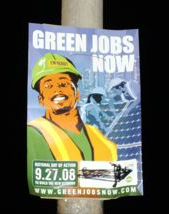Aside from the obvious focus on sustainability and the environment, what exactly are green-collar jobs? A good ‘ol dictionary.com definition offers that green-collar jobs are “pertaining to a working class in the environmental or agricultural sectors.” Is this just a fancy term for “tree-huggers” or a way for politicians to appear as if they are adding more jobs to the economy?
Maybe not.

Photo courtesy GreenForAll.org
The American Solar Energy Society released a report last month called “Renewable Energy and Energy Efficiency: Economic Drivers for the 21st Century” that indicates one in four U.S. workers will have a job in the renewable energy or energy efficiency industries by 2030.
These industries already generate 8.5 million jobs, a figure that could grow to 40 million jobs by 2030 – with the appropriate public policy, the report states.
This report defines the energy-efficiency sector as including everything from energy-efficient windows and appliances to insulation and recycling. Also, “solar, wind, ethanol, and fuel cells are likely to be some of the hottest areas of growth.” Read more or download the full report online .
Here’s an interesting article from BusinessWeek about people in the middle of their careers who decide to make a switch to greener pastures. According to this piece, many people take something they already know, color it green and turn it into a profession.
Plenty of business groups and nonprofit organizations are getting behind the green-collar movement.
The Apollo Alliance is a San Francisco-based coalition of business, labor, environmental and community leaders with a mission, in part, to expand green job opportunities. The organization just last week proposed an economic recovery strategy to “immediately create or retain 650,000 direct green-collar jobs and an additional 1.3 million indirect jobs in communities across the country.”
According to the Alliance’s Web site, the proposed “Apollo Economic Recovery Act” is a response to President-elect Barack Obama’s call for a “big stimulus package” in January to “jolt” the economy and “lay the groundwork for long- term, sustained economic growth.” You can read more or download the full proposal online .
A coalition of environmental and conservation organizations crafted a report called “Transition to Green” with recommendations for the new administration. Download the full report here.
The Green For All movement sees green-collar jobs as a way to lift people out of poverty. Based in Oakland, Calif., the organization is advocating for a government commitment to job creation, training and entrepreneurial opportunities in the green job sector.
With millions of people working in the green sector – or thinking about working in the green sector – surely that means more offices will be going green. You can hardly call yourself a green-collar worker and not recycle office paper or drink your coffee in Styrofoam cups. And working in a LEED-certified building sure wouldn’t hurt.
So the creation of more green-collar jobs is great news for the green office movement. With more individuals thinking about how they can have a green career, they’ll be spreading green through all aspects of their lives, including their cubicle.
Share your ideas on what it means to be a green-collar worker. Do you have a green job? How did you land in that position?
[ 2 comments ] ( 83 views ) | [ 0 trackbacks ] | permalink |




 ( 3 / 838 )
( 3 / 838 ) 


 Looking for a Green Office Solution?
Looking for a Green Office Solution?